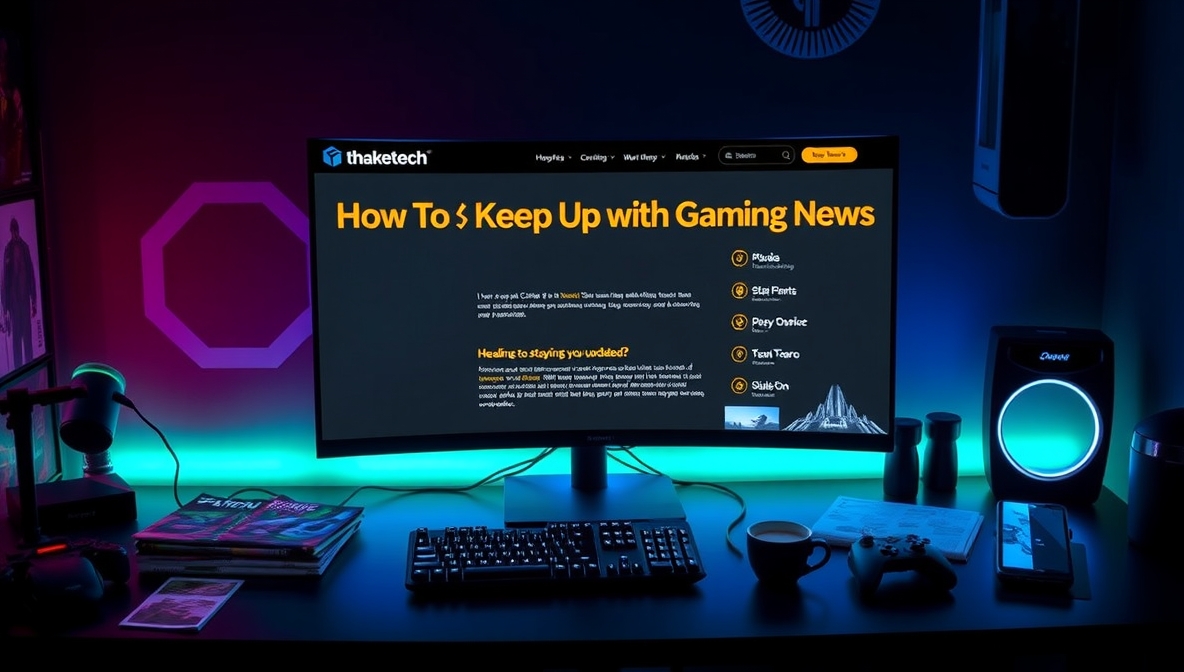Introduction
Gaming has become one of the defining industries of the 21st century. What was once considered a niche hobby for small communities has transformed into a global cultural and economic powerhouse. Millions of players connect daily across platforms, genres, and devices, sharing experiences that transcend boundaries of geography, language, and background.
The growth of gaming reflects not only technological innovation but also broader social and cultural changes. As the industry evolves, conversations around updates, community engagement, and the role of information-sharing have taken on new significance. Discussions like those connected with gaming updates thehaketech reveal how vital timely insights and shared knowledge have become for players, developers, and enthusiasts alike.
This article explores the evolution of gaming, the importance of updates, the role of communities, the economics of the industry, and the challenges it faces as it continues to expand. By tracing this trajectory, we gain a clearer picture of why gaming is not just entertainment but a key cultural force in the digital age.
The Early Days of Gaming
The gaming industry began modestly. In the 1970s and 1980s, arcade cabinets and home consoles introduced interactive entertainment to the mainstream. Titles like Pong, Pac-Man, and Super Mario Bros. became cultural icons, defining childhoods and setting the stage for an emerging industry.
These early games were static—once released, they remained unchanged. Players purchased cartridges or discs containing finished versions of games, with little possibility for modification. Communication among players was local, often limited to neighborhood arcades or living room gatherings.
By the 1990s, the rise of home computers and early online networks introduced experimentation with multiplayer gaming. Dial-up connections enabled players to compete remotely, though limitations in technology restricted scope and performance. Even then, the seeds of community-driven interaction and ongoing updates were being planted.
Fast forward to the present, and gaming has evolved into a living ecosystem. Titles are rarely static; they grow, change, and expand over time. Communities expect continuous refinement, whether in the form of balance adjustments, downloadable content (DLC), or seasonal events. This shift underscores why discussions like those surrounding gaming updates thehaketech resonate so strongly: players demand insight into evolving landscapes, not just initial releases.
The Rise of Online Gaming Communities
One of the most transformative developments in gaming has been the rise of online communities. Platforms like Xbox Live, PlayStation Network, and PC-based services enabled players across the world to connect, compete, and collaborate.
With this connectivity came new expectations. No longer content with solitary experiences, gamers sought spaces to share strategies, discuss lore, and celebrate achievements. Forums, fan sites, and eventually social media provided fertile ground for these interactions.
As games expanded in scale and complexity, so too did the need for communication. Massive multiplayer online games (MMOs), such as World of Warcraft, demonstrated how ongoing updates and developer communication could sustain engagement for decades. Communities became integral to the longevity of a game, often shaping development priorities through feedback and demand.
The rise of specialized content creators, streamers, and commentators further fueled this dynamic. Channels of information proliferated, offering analysis, news, and commentary. Within this ecosystem, resources like gaming updates thehaketech highlight the appetite for timely, reliable insights that connect players with the latest developments.
The Importance of Updates in Modern Gaming

Today’s games are not static products but ongoing services. news gaming industry thehaketech Updates are central to this model, influencing how games are played, perceived, and monetized.
Content Expansion
Developers regularly introduce new content to keep experiences fresh. Expansions, DLC, and seasonal events ensure that players remain engaged beyond initial release.
Balance Adjustments
Competitive games rely on updates to maintain fairness. Adjusting mechanics, fixing exploits, and refining performance are critical to sustaining trust within communities.
Technical Fixes
No game is perfect at launch. Patches address bugs, improve performance, and optimize compatibility with evolving hardware.
Community Feedback
Updates also reflect collaboration with players. Developers increasingly rely on feedback loops, listening to communities to shape future changes.
The sheer importance of updates cannot be overstated. They extend the lifespan of games, enhance engagement, and build trust between developers and players. This is why resources like gaming updates thehaketech carry value: they act as bridges between developers’ decisions and the community’s expectations.
Economics of the Gaming Industry
Gaming has grown into one of the largest entertainment industries, surpassing film and music combined. This expansion is powered by a diverse range of business models.
Traditional Sales
Physical and digital purchases remain significant, though they are no longer the sole revenue stream.
Free-to-Play Models
Games like Fortnite and League of Legends popularized free-to-play models supported by in-game purchases. Cosmetic items, battle passes, and microtransactions generate massive revenue.
Subscription Services
Platforms such as Xbox Game Pass and PlayStation Plus offer libraries of titles for monthly fees, reshaping how players access games.
Esports and Streaming
Competitive gaming and streaming platforms have created new revenue streams, drawing sponsorships, advertisements, and live event sales.
The financial success of gaming depends on sustained engagement, which in turn relies heavily on regular updates and community support. This symbiotic relationship explains why hubs like gaming updates thehaketech matter: they help sustain player interest by keeping audiences informed about what’s next.
Gaming as a Cultural Force
Beyond economics, gaming has emerged as a defining cultural force.
Storytelling Medium
Games now rival films and novels in storytelling, with complex narratives, immersive worlds, and emotionally resonant experiences.
Artistic Expression
From music to visual design, games showcase diverse forms of artistry. Entire industries support game art, soundtracks, and creative design.
Social Connection
Gaming fosters friendships and communities across borders. For many, online play is a primary social outlet, especially during global events like the pandemic.
Cultural Influence
Gaming influences fashion, language, and entertainment. Memes, phrases, and aesthetics drawn from games permeate popular culture.
The cultural relevance of gaming grows with every passing year, and timely information—such as that shared in gaming updates thehaketech—helps shape how these cultural conversations unfold.
Challenges Facing the Industry
Despite its successes, the gaming industry faces challenges that must be addressed to ensure healthy growth.
Crunch Culture
Reports of overwork and unsustainable development practices raise questions about the human cost of creating blockbuster games.
Toxicity in Communities
While gaming fosters connection, it can also breed toxicity, harassment, and exclusion. Platforms must balance free expression with safety.
Monetization Concerns
Microtransactions and loot boxes have sparked debates over fairness, ethics, and potential exploitation of players.
Accessibility
Ensuring games are inclusive for players with disabilities remains an ongoing challenge, though progress is being made.
Preservation
Digital distribution raises questions about preservation. Without physical copies, many games risk disappearing as servers shut down.
Awareness of these challenges is critical. By tracking developments and fostering transparency, sources like gaming updates thehaketech help players and observers hold the industry accountable.
The Future of Gaming
The road ahead for gaming is full of potential. Emerging technologies and shifting cultural dynamics promise to reshape the industry further.
Virtual and Augmented Reality
VR and AR offer immersive experiences that redefine how players engage with digital worlds.
Cloud Gaming
Cloud technology allows players to stream games without high-end hardware, expanding accessibility globally.
Artificial Intelligence
AI promises smarter non-playable characters (NPCs), dynamic storytelling, and personalized player experiences.
Cross-Platform Play
The walls between platforms are falling, with cross-play becoming increasingly standard. This enhances inclusivity and expands community interactions.
Greater Diversity
Representation in characters, stories, and development teams continues to improve, ensuring games reflect the diversity of global audiences.
As the industry evolves, the need for timely, reliable insights will only grow. The role of platforms like gaming updates thehaketech will remain central, connecting communities with the latest breakthroughs and trends.
Lessons for Players and Developers

The evolution of gaming offers important lessons for both players and developers.
For players, the key is digital literacy. Understanding how updates work, how monetization models function, and how to engage responsibly with communities ensures positive experiences.
For developers, the lesson is about sustainability and collaboration. Games thrive when developers listen to players, balance monetization with fairness, and prioritize ethical labor practices.
The ecosystem functions best when both sides recognize their shared role in shaping the future. Insights from sources like gaming updates thehaketech demonstrate how collaboration and information-sharing help foster a healthier, more sustainable industry.
Conclusion
Gaming has grown from pixelated experiments into a global cultural force. Its evolution reflects not just technological innovation but also the human desire for storytelling, connection, and community. Today’s gaming world is defined by continuous updates, vibrant communities, and an ever-expanding range of experiences.
At the heart of this expansion lies a critical truth: games are living ecosystems. They thrive on collaboration, feedback, and adaptation. Updates are no longer mere patches but cultural events that define the rhythm of engagement.
Resources like gaming updates thehaketech epitomize the role of information in this landscape. By connecting players with timely news, contextual insights, and shared experiences, they contribute to a culture where gaming is more than entertainment—it is a cornerstone of modern life.
As the industry continues its trajectory, the fusion of creativity, technology, and community will shape its orbit. The universe of gaming is vast, and its stars are still forming. The future belongs to those who not only play but also participate, share, and build together.




